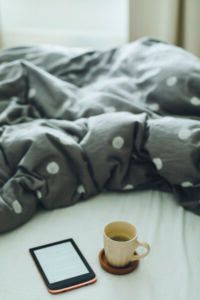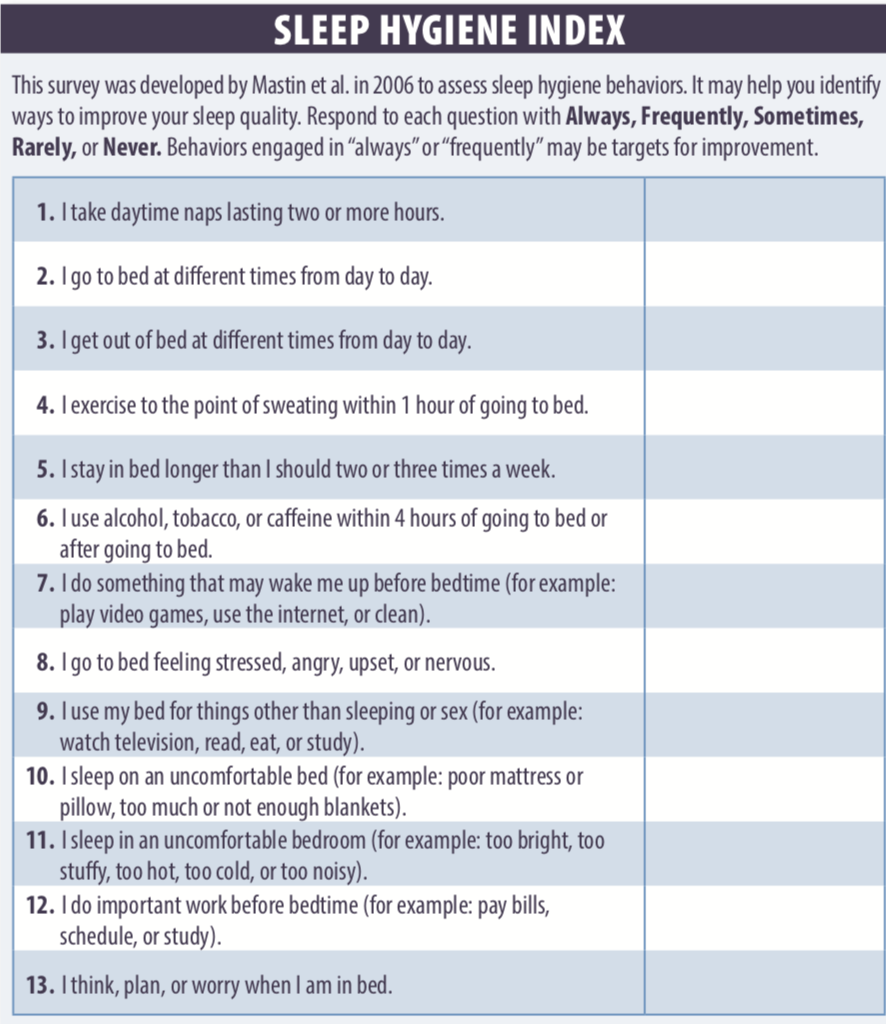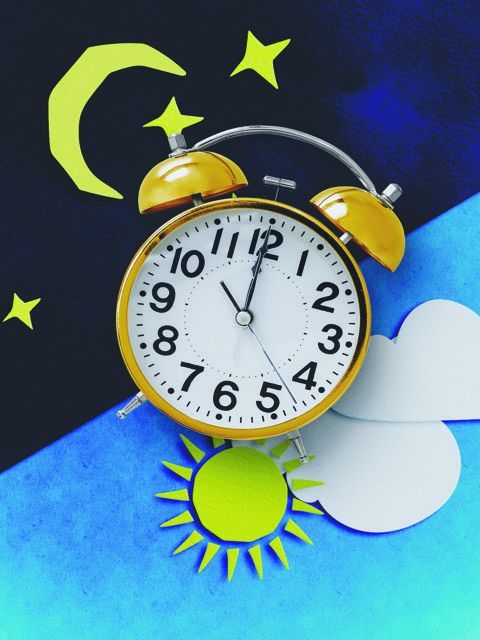Sleep has a major impact on health. Not getting enough quality sleep is associated with increased risk for cardiovascular disease, type 2 diabetes, high blood pressure, and overweight and obesity. It may also contribute to depression, moodiness, memory problems, learning difficulties, and decreased alertness and reaction time that can lead to accidents and workplace injuries.
“Most recent data suggest adults should aim for seven to eight hours of sleep a night,” says Aarti Grover, MD, medical director of the Center for Sleep Medicine at Tufts Medical Center. Unfortunately, more than a third of all U.S. adults report sleeping less than the recommended seven hours a night, and almost half say they often feel sleepy during the day.
Falling Asleep. “Some people fall asleep right away,” says Grover, “but taking 15 to 20 minutes to fall asleep is normal.” If it takes you longer than this, you may want to look into why. Short-term insomnia (trouble falling or staying asleep for a few days or weeks) has many causes. Stress, anxiety, and trouble ‘shutting down’ your thoughts are common issues. You may have trouble sleeping if you’re uncomfortable or if there’s too much noise or light in the room, or you may not be getting into bed at the right time. Like most living things, humans have a circadian rhythm—natural biological changes that follow a 24-hour cycle and are tied to light and darkness. “Your brain clock tells you when it’s time to sleep,” says Grover. “If you get into bed at nine o’clock and your body is not ready to sleep until 11, you could lie awake for those two hours.” A consistent bedtime can help reset and regulate your circadian rhythm.
One hormone involved in circadian rhythm is melatonin. “Melatonin is released two to three hours before your body’s intended bedtime,” says Grover. It is produced by the brain in response to darkness. Exposure to light after sundown—especially the blue light given off by electronics with screens—suppresses the secretion of melatonin. Using unfiltered phones, tablets, and laptops in the two to three hours before bed could therefore contribute to trouble falling asleep.
Other things you do before bed can also be part of the problem. Caffeine is one culprit. It can take more than five hours to eliminate caffeine from your body, so drinking regular coffee, caffeinated tea, and cola in the second half of the day could impact sleep. Physical activity is another issue. While being physically active during the day is associated with better sleep, getting your heart rate up too close to bedtime can cause the release of adrenaline that may leave you feeling wakeful when you want to go to sleep. Don’t count on a nightcap to help you sleep. Alcohol might relax you and help you fall asleep, but it has been shown to significantly reduce sleep quality.
According to the National Institutes of Health (NIH), chronic insomnia is defined as poor sleep three or more nights a week that lasts for more than three months and cannot be fully explained by another health problem. If you experience this type of long-term insomnia, seek medical help.
Staying Asleep. “There are multiple disorders that can lead to sleep interruptions,” says

Many factors, including looking at electronic screens before bed and drinking caffeine too late in the day, can make sleep difficult.
Grover. “Some of them can be addressed by behavioral changes, and some should be treated by a health-care professional. If you find yourself consistently waking up in the night, get an assessment from your primary care physician or a sleep specialist.”
According to the National Sleep Foundation, nearly 69 percent of men and 76 percent of women over 40 get up at least once a night to use the bathroom. Going more than once a night is called nocturia. Some possible causes include high fluid intake before bed (especially caffeinated beverages or alcohol), an enlarged prostate (in men), kidney problems, high blood sugar/uncontrolled diabetes, fluid retention (caused by edema, congestive heart failure, or a high sodium diet), or certain drugs (including diuretics and lithium). You could also have a condition that keeps your bladder from emptying fully.
Obstructive sleep apnea, in which the upper airway becomes blocked during sleep, is a common (and underdiagnosed) condition. This breathing disorder affects 15 to 30 percent of males and 10 to 30 percent of females and risk increases with age and weight. You may be unaware you are awakening multiple times a night to catch your breath but will likely be sleepy during the day. You (or those around you) may also notice changes in your memory, decision making skills, concentration, and behavior. Sleep apnea also increases your risk for health problems like heart disease, high blood pressure, and stroke. If you (or someone who listens to you snore) are concerned, ask your health-care provider to order a sleep study and discuss treatment options.
Eating or drinking less than an hour before bedtime is associated with increased risk of trouble staying asleep, as are medical conditions include parasomnias (like sleepwalking and night terrors) and sleep-related movement disorders, including restless leg syndrome, periodic limb movement disorder, leg cramps, and bruxism (jaw clenching and grinding).
Too much sleep may also be cause for concern. “Sleeping longer than nine or 10 hours a day is not recommended,” says Grover. “Consistent long sleep could indicate depression or another illness, and research suggests it may be associated with heart disease.”

What to Do. If you have trouble falling or staying asleep, or if daytime sleepiness has you questioning the quality of the sleep you’re getting, consider speaking to a health-care provider. If there is no medical reason for your sleep issues, addressing your “sleep hygiene” may help. Good sleep habits, like always going to bed at the same time, restricting caffeine intake to the morning and perhaps early afternoon, avoiding the blue light from electronics two to three hours before bedtime, and using your bed only for sleep and sex may help.
➧ Keep to a schedule. Find a good bedtime and wake time for your body and be consistent (even on weekends) to help regulate your circadian rhythm.
➧ Set the mood. Make sure your bedroom is quiet, dark, and at a comfortable temperature.
➧ Relax. Try to reduce sources of stress. Plan for time to unwind before bedtime. Practice deep breathing, read a book, do yoga, meditate, listen to calming music, or do anything else that relaxes you.
➧ Be sleepy. Go to bed when you feel sleepy. If you don’t fall asleep after 20 minutes, get out of bed and do a relaxing activity that doesn’t involve screens.
➧ Avoid confusion. Use your bed only for sleep or sexual activity.
➧ Don’t be blue. Avoid looking at bright screens two to three hours before bedtime. If you have to use electronics, consider wearing blue light blocking glasses or apply a setting or app designed to filter the light on your devices.
➧ Limit naps. Don’t nap more than one hour a day (science suggests the sweet spot is about 20 to 30 minutes).
➧ Watch what you eat and drink. Don’t go to bed hungry, but avoid caffeinated beverages, alcohol, and large meals before bed.
➧ Get moving. Regular physical activity may help you sleep better, but don’t be active too close to bedtime.
➧ Seek help. If these tips don’t help, or if you have chronic insomnia, need to use the bathroom more than once a night, snore and gasp in you sleep, or have another issue that routinely gets in the way of sleep, see a health-care provider for help.
Research shows relaxation techniques like deep breathing and meditation, listening to music, practicing yoga, and performing tai chi can improve sleep quality in individuals without clinical sleep disorders. Making sure your environment is conducive to good sleep and getting regular physical activity (not too close to bedtime) can be helpful, and some data support aromatherapy, massage, sleep education, and psychotherapy as well. For more tips on how to get good quality sleep, see the Take Charge! box. Sleep well!

























Sleep advice always says not to watch TV in the bedroom before sleep. That advice is counter to what I and many I know experience. It is fine advice if you share your bed with a significant other with whom you can cuddle, share concerns, be reassured, and have concerns put off by supportive sharing. For those of us who do not have this comfort, the TV provides a diversion from stressful remutating. Watching light entertainment, humor, and mindless shows is relaxing and not interesting enough to keep one engaged, thus, easily putting one to sleep. It is time theat the “professionals” review their understanding of a large portion of the population.